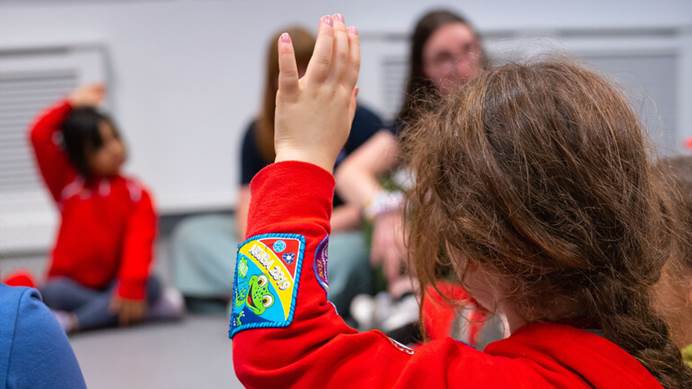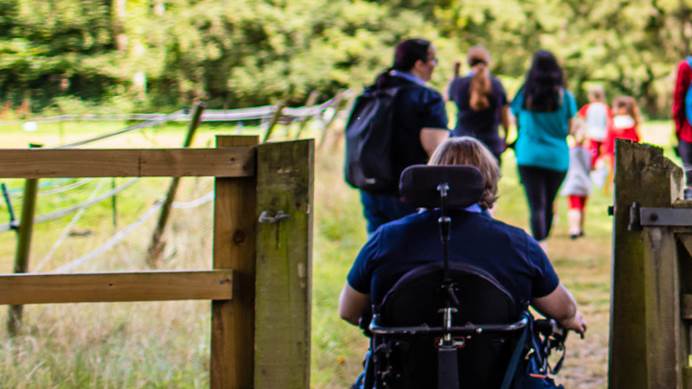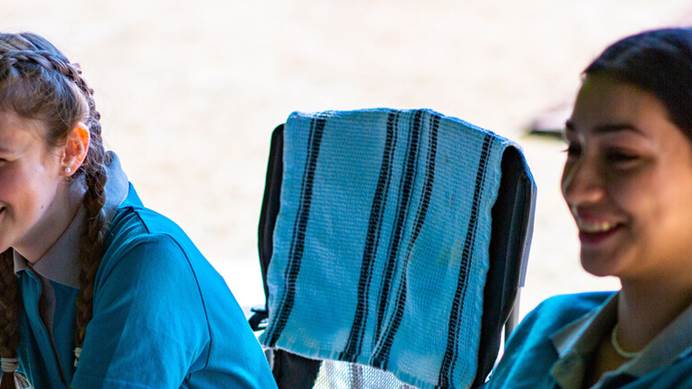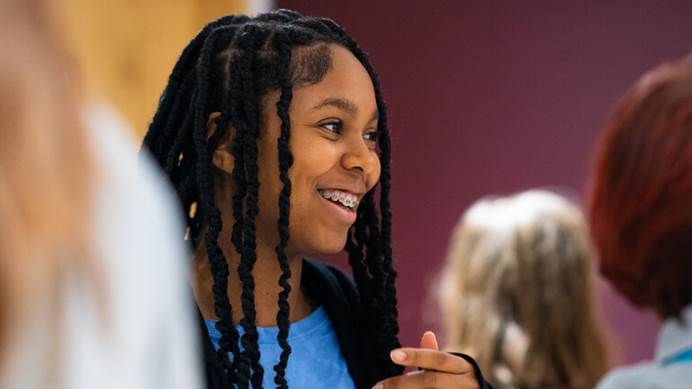Recognising domestic abuse
Understand more about the signs of domestic abuse, and how we can help and support all our members
Children, young people, and adults have the right to live free from abuse and violence in all areas of their lives.
And we all, as Girlguiding members, need to help protect and promote the safety and wellbeing of those in our organisation. This advice and guidance on domestic abuse will help you understand more about what domestic abuse is, and how you can recognise and support those who are at risk of harm.
If you’re worried, or have received a disclosure, that somebody in Girlguiding may be experiencing or is at risk of experiencing abuse, you should follow our safeguarding reporting procedures.
If you’re not sure whether you should take a concern seriously, or whether you should report, you should report it anyway.
If someone is in immediate or serious risk of harm, call 999 and call the safeguarding team afterwards. Let the safeguarding team know as soon as you can if you call the police.
If you're a member of British Guiding Overseas please contact your the chief commissioner as soon as possible for more advice. Extra details are available on our safeguarding procedures webpage.
You can contact the Girlguiding HQ safeguarding team on:
- +44 020 7834 6242 (9am-5pm Monday-Friday, not Bank Holidays)
- Out of hours emergency phone: +44 07508 032997 (5pm-10pm Monday-Friday; 9am-10pm Saturday and Sunday)
- Email: [email protected]
What is domestic abuse?
Domestic abuse is defined as any controlling, coercive or threatening behaviour, violence, or abuse by partners, ex-partners or family members. This can also include behaviours that limit a person’s financial independence.
Domestic abuse includes a range of abusive behaviours, and not all might seem ‘violent’.
Find out more about what domestic abuse is on the Refuge website.
Types of domestic abuse
Types of domestic abuse include:
- Coercive control
- Physical abuse
- Sexual violence, rape and assault
- Psychological or emotional abuse
- Financial and economic abuse
- Harassment and stalking
- Online or digital abuse
Go to Love is Respect's website for explanations of these types of domestic abuse. Also read our policies on anti-bullying and harassment and digital safeguarding.
Other types of domestic abuse include:
- Forced marriage
- ‘Honour’-based crimes
Visit the Karma Nirvana website for more information on forced marriage and honour-based abuse.
Domestic abuse and young people
Being subjected to or seeing domestic abuse it can have a devastating impact on children and young people that can last into adulthood. Witnessing domestic abuse is child abuse.
Children and young people might feel confused or frightened and keep the abuse to themselves. Their distress can be expressed with behaviours that may be a sign that they have or are being exposed to domestic abuse. These behaviours can include:
- Bullying
- Aggression
- Attention seeking
- Bedwetting, insomnia, or nightmares
- Eating disorders
- Anxiety, depression, or suicidal thoughts
- Constant or regular sickness such as mouth ulcers, colds, or headaches
- Problems in school or troubles with learning
- Withdrawal
It's important to know that every child will respond differently to trauma and some might be more resilient and not show any negative effects.
Does this sound like your situation?
If any of the above sounds like a situation you or someone you know is in, there are organisations can give you advice, guidance, or support.
Support organisations
There might be local organisations available to you that aren’t on this list.
Refuge: Supporting women and children who've experienced violence and abuse.
Women's Aid: A grassroots federation working together to provide life-saving services in England and build a future where domestic abuse is not tolerated. They've also produced an Expect Respect Healthy Relationships Toolkit to help lead sessions around healthy relationships for children and young people aged 4-18.
Women's Aid (Northern Ireland): A lead voluntary organisation in Northern Ireland addressing domestic and sexual violence and providing services for women and children.
Women's Aid (Scotland): A lead organisation in Scotland working towards the prevention of domestic abuse.
Women's Aid (Wales): The national charity in Wales working to end domestic abuse and all forms of violence against women.
Muslim Women's Network UK: A national specialist faith and culturally sensitive service that’s confidential and non-judgmental. They primarily offer information, support, guidance and referrals to Muslim women and girls from diverse backgrounds who are suffering from or at risk of abuse or facing problems on a range of issues.
Ava Project: A leading UK charity committed to ending gender-based violence and abuse.
Hot Peaches Pages: An international list of sexual & domestic violence agencies with abuse information in over 115 languages and information on abuse help agencies for every country in the world.
Childline: A service that’s run by the NSPCC. Childline is there to help anyone under 19 in the UK with any issue they’re going through.
Men's Advice Line: A team of friendly advisors will listen and believe you. Their team is available to offer non-judgmental support, practical advice, and information.
ManKind: Their confidential helpline is available for male victims of domestic abuse and male victims of domestic violence across the UK. They support men suffering from domestic abuse from their current or former wife or partner (including same-sex partners).
Karma Nirvana: A mational charity supporting victims of honour-based abuse and forced marriage. Honour crimes aren't determined by age, faith, gender, or sexuality and they support and work with all victims. They run a national helpline offering direct support and guidance to victims and professionals.
Galop: Emotional and practical support for LGBT+ people experiencing domestic abuse. The National Lesbian, Gay, Bisexual and Trans* (LGBT) Domestic Violence Helpline provides confidential support to all members of the LGBT+ communities, their family, friends, and agencies supporting them.
Respect phoneline: A confidential helpline, email and webchat service for domestic abuse perpetrators and those supporting them. They support men and women who are using abuse in same-sex or heterosexual relationships.
Raising awareness of violence against women and children
WAGGGS have developed the stop the violence campaign. It's aimed at ending violence against girls and young women around the world.
British Guiding Overseas (BGO)
Even if you're outside of the UK, you’ll still be able to access all internet support from the above resources. But you’ll need to check for guidance specific to your country to ensure that the information you rely on is accurate.
If you're in immediate danger or scared for your safety, or you’re worried about the immediate safety of someone else, call 999.
The silent solution
If you can’t speak on the phone about your situation, use the silent solution. This lets you tell the police that it is a genuine emergency without speaking:
From a mobile phone:
- Phone 999 from a mobile
- Listen to the questions from the operator
- Respond by coughing or tapping the handset if you can
- If prompted, press 55. This lets the operator know it is a genuine emergency and you will be passed through to your local police force.
From a landline:
- Call 999 from a landline
- If you don't speak or answer questions and the operator can only hear background noise, they'll transfer your call to the police.
- If you replace the handset, the landline may remain connected for 45 seconds in case you pick it up again.
- Calling 999 from a landline automatically gives the police information about your location.
For more information about the silent solution, visit the website.




